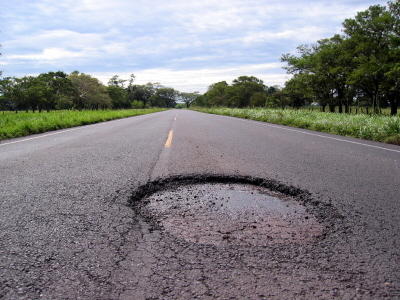Growing up in northern Wisconsin, we joked about experiencing two seasons each year: winter and construction. And it wasn’t far from true. As soon as the top layer cleared, crews were busy working on the roads, filling in all the cracks, holes and craters that riddled the roads. They worked feverishly, non-stop, until the snow finally brought the backhoes to a halt.
 There can be potholes in the study of history as well, and the arts can repair them.
There can be potholes in the study of history as well, and the arts can repair them.
Behind Discovering Music lies the premise that music and the arts can draw together the events of history, synthesize them, and make them come alive. If the dates, places and events of history have no people or personalities to enliven them, then those dates, places and events can be difficult to memorize. Which can leave the mental road through history riddled with potholes, as the following story illustrates.
In high school, I was a good student. (Not merely gratuitous bragging, this is actually relevant later!) I was in an honors English class and an honors history class. In that history class I remember learning all about World War II and spending a long time on it. (That’s also relevant later.) I got good grades. I was even awarded a four-year scholarship for college. So off I went to college, where I did equally well.
Fast-forward about four years. Having majored in English and music as an undergrad, I decided to combine those two disciplines in graduate school by studying music history. My very first day at Southern Methodist University (while standing in Professor Carol’s office, as a matter of fact), a second-year graduate student asked me what my area of concentration was – a question often asked of music history majors. Hmm. I scrambled. In my head, I quickly skimmed through the music I had played and enjoyed over the years.
“Maybe Czech music,” I said.
I did eventually settle on Czech music. I even went on to study in what was then Czechoslovakia. I took classes in Czech language, history and culture taught by English-speaking Czech professors. And it was in one of those classes that I stumbled into one of the big potholes in my education.
In World-War-II-era history class, Professor Boreslav Hnizdo (yes, it sounds like a sneeze) referred over and over to Munich – but referred to it as if it were an event, not just a place. “After Munich 1938 . . . , before Munich 1938 . . . .“ Clearly everyone else in the class knew what this was and not just where it was. I sat quietly in my ignorance, and after two or three days of this, I finally summoned the courage to ask a fellow student (outside of class, of course) what the deal was with Munich. Oh my.
Merely one of the defining events of WWII! Of course the professor wasn’t explaining what it was – he shouldn’t need to! A basic understanding of WWII history should make the word Munich at least ring a bell, especially for someone who had studied WWII specifically, at length. How did I get through high school (including that honors history class), a liberal arts undergraduate education, and a year of graduate music history study and not know this, not even vaguely remember it?
Admittedly, Munich is just one event, and forgetting one event isn’t unusual. More important than just Munich, however, was the larger question: how did I manage to forget important dates, places and events after mastering them for exams? Despite being a good student who used good study habits to get good grades, the span of world history – in my mind – loomed amorphous, huge and unmanageable.
In the end, it was a Czech composer named Mr. Hedgehog who helped repair this particular pothole. Actually, his name was Jezek but that translates to hedgehog in English. I’ll tell you about him in my next post.



